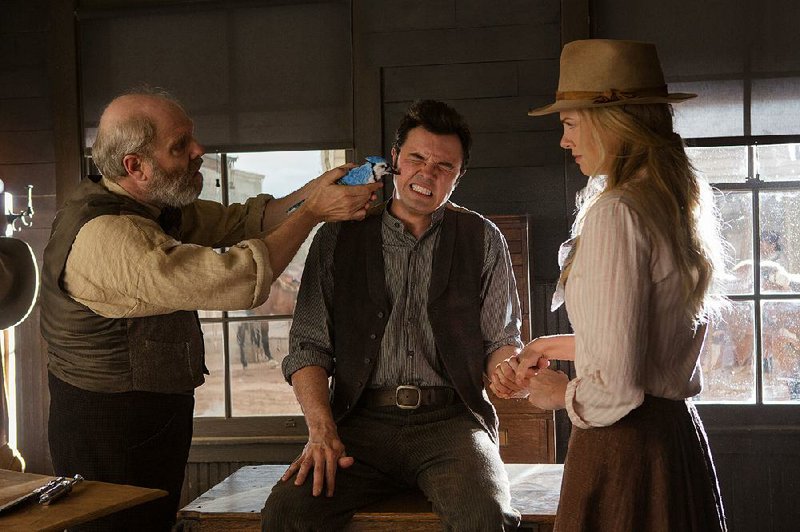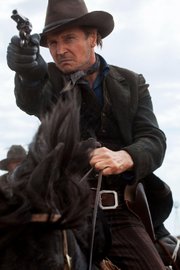Much of A Million Ways to Die in the West is very, very funny. The moments in between, which range from unsuccessful to downright awkward, get a pass for being good-natured.
Please understand that good-natured isn't the same as family-friendly. If you're distressed when confronted by absurdly bloody pratfalls, graphic body-function demonstrations, rampant misogyny and gay-bashing, an astonishing level of cursing, detailed descriptions of sexual acts, ethnic insults, crude put-downs, and imaginatively disgusting situations, this ruckus of a comedy isn't for you. And although it's puerile, don't bring the kids. Really.
A Million Ways to Die in the West
88 Cast: Seth MacFarlane, Charlize Theron, Amanda Seyfried, Liam Neeson, Neil Patrick Harris, Giovanni Ribisi, Sarah Silverman, Wes Studi
Director: Seth MacFarlane
Rating: R for crude and sexual content, language, violence, drug material
Running time: 116 minutes
The film's title refers to a major drawback of living in 1882 Arizona according to Albert (MacFarlane), a mediocre sheep farmer who complains to whomever will listen about the death-defying challenges of his environment. Using slang-loaded language typical in the 21st century (it's doubtful that "awesome" was in widespread use in the 1880s), Albert spends what should have been a romantic waterside outing whining about unsafe conditions to his beloved Louise (Amanda Seyfried).
No-nonsense Louise, who regards such unmanly behavior as unattractive, coolly transfers her affections to wealthy sophisticate Foy (hilariously played by Neil Patrick Harris).
Devastated Albert, who never saw this coming, is served booze and sympathy during a saloon outing with best pal Edward (Giovanni Ribisi) and his wife-to-be Ruth (Sarah Silverman), a very busy (and noisy) prostitute. Then, when a brawl breaks out (one of the aforementioned ways to die), Albert somehow manages to rescue new-to-town Anna (Charlize Theron) from the melee.
From then on, this gorgeous, capable, spirited and worldly wise woman is the one doing the rescuing. Anna is instrumental in helping Albert envision an existence beyond Louise, one filled with potential and confidence. For a while, anyway -- until Anna's cruelly criminal cohort Clinch (a studly Liam Neeson) shows up.
Theron, who won an Oscar for her portrayal of a serial killer in Monster, shows off a relaxed, accessible approach to comedy that contrasts with MacFarlane's incessant chatter. Albert is stuck with too much dialogue, which forces the character to blather on while Anna observes him with a mix of pity and wonder. Then, time after time, she comes back with a clever remark that dominates the scene. The screen seems to get brighter whenever she appears.
Silverman, usually acerbic, embraces the role of a happy hooker who has no trouble separating her sex-industry work from her desire to make her wedding night special. Ruth's interplay with Ribisi's doltish Edward is an inspiration to all lovers who aren't cut from the same cloth.
An assortment of cameos quickly come and go, adding a visual spark but not much else. And there's a dog. Luckily, this isn't a Southern movie. You know what happens to dogs in Southern movies.
Fans of MacFarlane's Fox series Family Guy and his 2012 comedy hit Ted are aware of his fondness for ridiculing people and situations that have it coming. Here the idyllic image of the Old West is the victim, from the film's classic opening-credit sequence to an almost obligatory run-in with local American Indians (led with sly panache by Wes Studi) that turns the noble image of the tribe on its head. Other sitting ducks include Seyfried's big eyes, Albert's innocent sheep, cranky aging parents, and an unfortunate gold miner.
About the only aspect of the film that plays it straight is the grand oh-so-1950s-Western score by Joel McNeely, bringing back memories of 1962's How the West Was Won and 1958's The Big Country. And there isn't much that MacFarlane could do to wreak havoc on the magnificent and ruggedly Western backdrop of Monument Valley. Not that he didn't try.
MovieStyle on 05/30/2014

